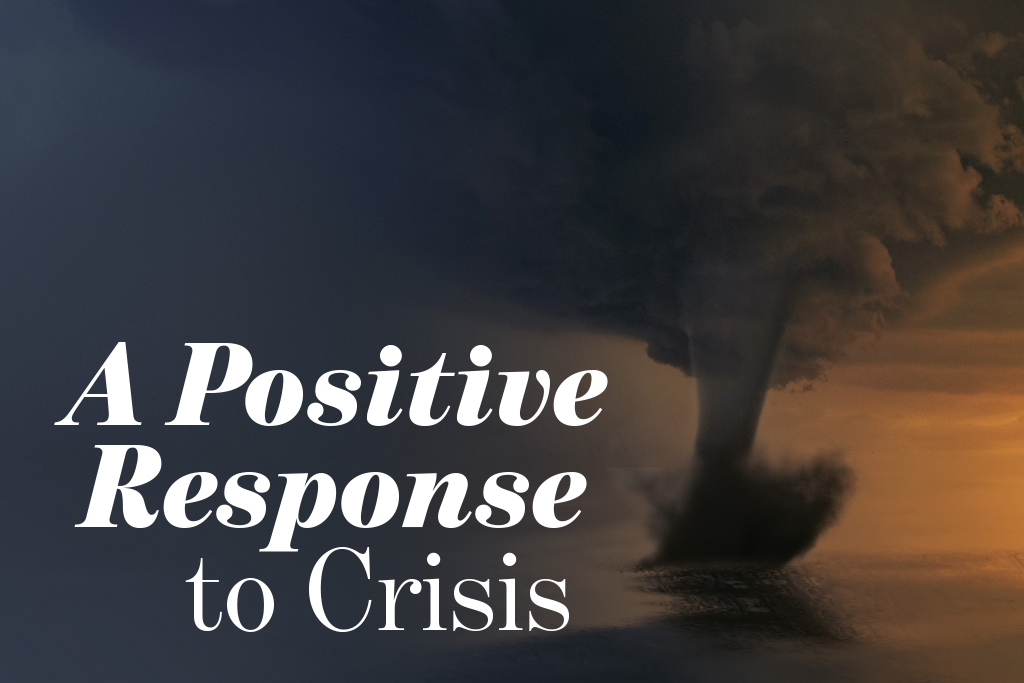
What is crisis? A crisis is an event, circumstance, or situation affecting you or your environment over which you have no direct cause, control, or responsibility. News updates and headlines broadcast that the world is in crisis, as a result of global recession. To recess means to stop and draw back. When this word is used in terms of the economy, it means that the economy has stopped growing and has started contracting. One of the most detrimental effects of such activity is fear - the lack of consumer confidence in the economy. Consumer confidence is important because everything in the world's economy depends on people buying and selling. As this challenge has spread from nation to nation beyond the direct control of citizens of the global community, we can indeed agree that the world is in crisis.
Despite the fear and anxiety that come from crisis, understanding the concept of crisis can bring great perspective on one's response to it. As previously stated, a crisis is an event, circumstance, or situation over which you have no direct cause, control, or responsibility. Leaders of organizations and companies cannot control what is happening in the world around them. Similarly, pastors and ministers cannot control what is happening in the communities around them. Why is this important to understand? Consider national crisis such as natural disasters or adverse weather conditions. No one can control a hurricane or a tornado; therefore, everyone must prepare himself or herself to adapt, adjust, and ride out the experience.
However, despite the inability to control crisis, it is important for you to remember that you are always in control of one thing - your mind. You cannot control a hurricane, tornado, the wind, or the economic downturn in the world. However, you can control the way that you think about them. This factor is very important because your mindset and your thoughts are necessary in order to interpret and respond effectively to the crisis. It is during this period of economic turmoil that true leadership will be revealed, and counterfeit leadership will be exposed. True leaders do not panic in crisis; they plan. They do not lose control in crisis; they manage. Therefore, how you think is more important than what happens around you.
I have experienced many challenges in life, and over time, I have learnt that whatever you call or label a thing, that is what it becomes to you. I used to tell people years ago that I had problems. However, I do not do that any more. I always say now that I have opportunities to grow. Whenever something happens in my life that I did not expect or cannot control, my thought patterns are that this is an opportunity for me to test some untapped abilities, to use some skills that I never used before, and to draw on hidden potential.
Whatever you see a situation to be controls your response to it. Controlled perception is not denial of reality, but it is a controlled response to reality. In other words, I am not suggesting that you go around saying, "It does not exist. It does not exist." Economic problems do exist. People are losing their jobs. Houses are in foreclosure. These events are now a reality for many people around the world; however, you must control how you think about all of these events.
Consider God's perspective of crisis, as recorded in Scripture. Many times in the Bible, we see that God interrupted humans in times of crisis, and He would say, "Be not afraid" (Gen 15:1; 26:24). Why? Like humans today, characters in the Bible began to interpret the environment as a reason for fear. If your thoughts become a victim of your circumstance, the circumstance wins. As a leader of a business, church, community group, or your family, you cannot allow the environment to control you. People are counting on you to take them through the crisis. Crisis is not a problem but simply a change in the environment that demands a new, unscheduled response. You must decide how you are going to respond. Crisis helps you to discover an innovative, creative person that you never knew lived inside of you.
The Positive Effects of Crisis
Crisis is the source of creativity. When there is innovation, it is usually a result of crisis. Humans have always advanced under pressure. Your parents or a teacher may have told you years ago that necessity is the mother of invention. What they meant by that is that when you have to do something, you find a way to do it. Moreover, there are positive effects that come as result of the demand on you to work through crisis. Firstly, as stated, crisis is the source of creativity. If you lose your job, I know that you are going to set your mind on what you will have to do to live. Crisis is the incubator for innovation and the womb for creativity.
Secondly, crisis produces a sense of solidarity. In times of difficulty, people begin to work together. Individuals begin to cooperate as a community. There is an understanding that when we are all in trouble, we all have to help. Crisis can give us back our sensitivity. Finally, crisis causes you to re-prioritize your life. It makes you understand what is important again. You begin to ask yourself, "What are the real, basic things that are important to me?" Crisis brings you back to the simplicity of life.
In the Bahamas, my home country, we have also faced economic struggle and hardship. In my organization and our church, we have had to learn to respond to these difficult times affecting the whole world. Personally, my response to help others in crisis, I released a new book, Overcoming Crisis: The Secrets to Thriving in Challenging Times. I wanted to identify ways to help people navigate through seasons of difficulty whether their challenges are economic, personal, or corporate. For those facing great hardship under economic crisis, I encourage you that no matter what is happening, it is temporary. God promises, "To everything there is a season" (Eccl 3:1a). He is promising you that whatever you are going through can only last a season. Seasons change. More importantly, Christ is unchanging and everlasting.










































































